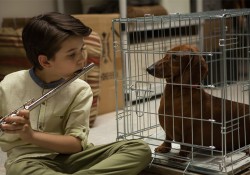Cinema | April 20th, 2016

At the Sundance Film Festival, writer-director Todd Solondz described drawing his inspiration for “Wiener-Dog” from an unlikely pair of cinematic hallmarks: Robert Bresson’s “Au Hasard Balthazar” (1966) and Joe Camp’s “Benji” (1974). Solondz’s movie, as dark, hilarious, and observant as any of the features in his deeply impressive filmography, does indeed borrow from those two movies, aligning with Bresson’s unflinching examination of life’s cruelties and Camp’s flair for open and earnest communion with the lessons we can learn from our four-legged friends.
Like the long-suffering donkey in Bresson’s phenomenal masterwork, the title dachshund of Solondz’s film passes from keeper to keeper, silently witnessing a parade of the filmmaker’s signature oddballs and outsiders as they struggle with disappointments, humiliations, and defeats. The whole affair plays out in Solondz’s familiar, off-kilter neighborhoods, and longtime fans will undoubtedly be pleased that the director continues his fascination with darkest facets of ourselves – and does so with his ever-present grace. Few cinema artists have matched Solondz’s ability to withhold judgment of and fully humanize pedophiles and predators.
The storytelling structure plays out as a series of chapters, inevitably inviting post-screening conversation in which the merits and possible shortcomings of each of the segments can be argued and ranked.
The first of the tales is an absolute humdinger. A now cancer-free 9-year-old named Remi (Keaton Nigel Cooke) invests his affection in the newly acquired pooch. Friction between Remi’s mother (Julie Delpy) and father (Tracy Letts) is mirrored by the stress of the pup’s unplanned bodily functions, and a sustained tracking shot of seemingly limitless diarrhea set to “Claire de lune” competes directly with Delpy’s speech schooling Remi on the realities of canine rape for one of the biggest laughs in the movie.
The subsequent caretakers of the title pet, like the custodians of Balthazar, will not all treat her with the same love shown by Remi, and Solondz brilliantly maintains audience interest via the foreboding suspense that something awful might happen to Wiener-Dog.
Todd McCarthy finds a flaw in “how the lead character becomes increasingly marginalized as the story lurches along, to the point where she’s more of an ornament than a figure of any central importance either dramatically or to her master of the moment.” While this position will not be shared by all viewers, Solondz’s choice to omit a character like Anne Wiazemsky’s Marie (whose own trials are paralleled with Balthazar’s even after the two are separated) refocuses audience attention each time the dog is passed along.
While Ellen Burstyn’s bitter, regretful Nana and Greta Gerwig’s Dawn Wiener both project galaxies of intrigue and imagination through the actors’ wonderful performances, Solondz lavishes a great deal of attention on a self-reflexive metanarrative in which Danny DeVito’s Dave Schmerz, a fading teacher and screenwriter at the breaking point, implicates the hound in a shocking plot when he can no longer suffer the ridicule and indifference of his callow, entitled students.
Happily, the film’s conclusion delivers everything one wants of Solondz and then some, commenting as it does on the legacies of the creative, our understandings and misunderstandings of the philosophy of art, and the fine line between life and death.
“Wiener-Dog” will be released in June.
March 2nd 2026
February 23rd 2026
February 23rd 2026
February 16th 2026
February 16th 2026
_(1)_(1)_(1)_(1)_(1)__293px-wide.jpg)

_(1)__293px-wide.png)


_(1)__293px-wide.jpg)